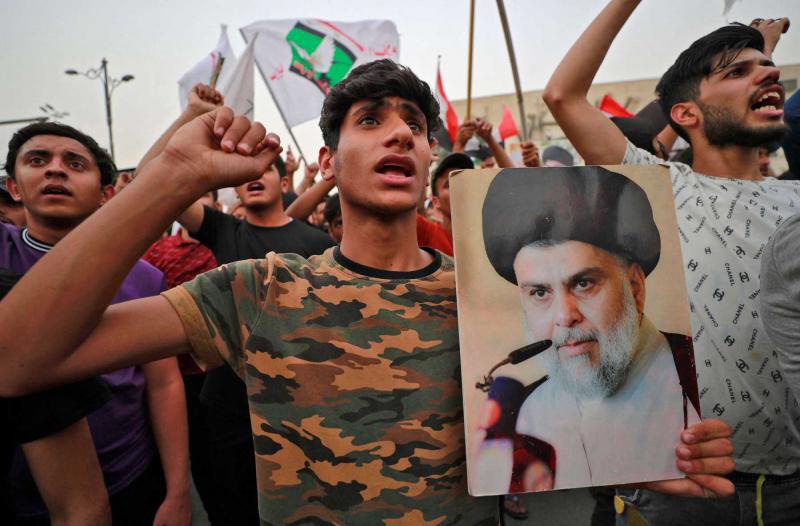
Sadr pushes anti-normalisation bill through parliament to reassure Iran, claim ‘victory’ at home | | AW
BAGHDAD, Iraq-
Iraq’s parliament approved a law on Thursday that will ban normalising relations with Israel, in a move intended by populist leader Moqtada al-Sadr as a political message to his home constituencies and to Iran.
The law was approved with 275 lawmakers in the 329-seat assembly. A parliament statement said the legislation is “a true reflection of the will of the people.”
The legislation says that violation of the law is punishable with a death sentence or life imprisonment
Analysts said the anti-normalisation move was an attempt by Sadr to claim a populist victory after having failed to make any progress in resolving the country’s political impasse, nearly eight months after the legislative ballot. Rival blocks have yet to agree on a nominee for president and prime minister. Parliament could not even pass an emergency food security bill.
The fiery Shia cleric, whose party won the largest number of seats in Iraq’s parliamentary elections last year, called for Iraqis to take to the streets to celebrate this “great achievement.”
The first deputy-speaker of parliament, Hakim al-Zamili, who belongs to the Sadrist Current, put out a statement saying the legislation “truly reflects the will of the people, a brave national decision and a position that is the first of its kind in the world in terms of criminalising the relationship with the Zionist entity.” He called on Arab and Islamic parliaments to adopt similar legislations to meet “the aspirations of their peoples”.
But the issue of normalisation with Israel has hardly been a priority demand for Iraqis, who are more focused on their deteriorating living conditions and the growing food crisis.
Sadr’s move is connected to tensions between Tehran and Iraqi Kurdistan and is intended to reassure the Iranian regime and its proxies in Iraq of the maverick leader’s goodwill, analysts point out.
Lawmakers from Sadr’s party said they proposed the law to curb any claims by Iranian-backed rival parties that Sadr is making coalitions with Sunni and Kurds who may have secret ties with Israel.
Pro-Iranian militias were clearly pleased. “Approving the law is not only a victory for the Iraqi people but to the heroes in Palestine and Hezbollah in Lebanon,” said Iraqi Shia lawmaker Hassan Salim who represents Iranian-backed militia Asaib Ahl al-Haq.
Despite his claims of independence from Tehran, through the bill Sadr is sending a message of support and loyalty to Iran at a time of mounting tensions between the Tehran regime and Israel.
The Sadrist movement introduced the bill after accusations of connections to Israel were levelled at his political allies within the Alliance to Save the Homeland, which includes the Sadrist bloc, the Kurdistan Democratic Party and the Sovereignty Coalition
Iran has repeatedly accused Iraqi Kurdistan leaders of ties to Israel. Earlier this year, its Revolutionary Guards fired a dozen ballistic missiles towards the northern city of Erbil in the Kurdish-run north, saying it was targeting an Israeli intelligence base.
The home of Baz Karim, the CEO of the oil company KAR GROUP, was heavily damaged in the attack. KAR has been accused in the past of quietly selling oil to Israel.
A report by the Iraqi parliament’s fact-finding committee said it found no evidence to support Iranian accusations of an Israeli spy base in Erbil.
Some tribal leaders have also accused the Sovereignty Coalition, especially its leader Muhammad al-Halbousi, of carrying out an “Israeli agenda” in Iraq’s Sunni heartlands.
It is unclear how the law will be implemented as Iraq has not recognised Israel since the country’s formation in 1948; the two nations have no diplomatic relations. But the legislation also entails risks for companies working in Iraq and found to be in violation of the bill.
The United States said it was deeply disturbed by the Iraqi legislation. “In addition to jeopardising freedom of expression and promoting an environment of antisemitism, this legislation stands in stark contrast to progress Iraq’s neighbours have made by building bridges and normalising relations with Israel, creating new opportunities for people throughout the region,” State Department spokesman Ned Price said in a statement.
No comments:
Post a Comment